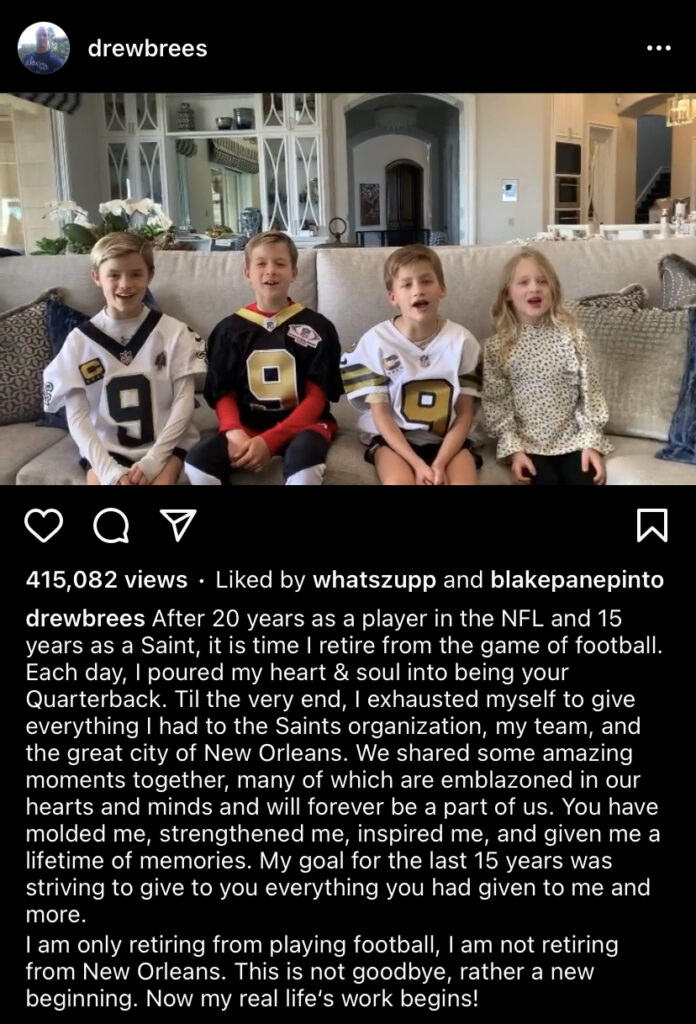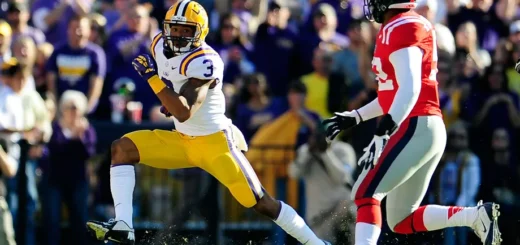Drew Brees has retired as the greatest quarterback of all-time
After 20 seasons in the NFL, Drew Brees officially announced his retirement in an Instagram post Sunday afternoon.
He leaves the game as, unquestionably, the greatest player in the history of the New Orleans Saints. As a member of the world champion 2009-2010 team, Brees was MVP of Super Bowl XLIV.

His legacy is not without complications, but the list of his accomplishments is vast. Brees owns countless NFL records, among them: Most career passing yards (80,358), most career passing completions (7,142) and highest career completion percentage (67.69%). He is second all-time in career passing touchdowns with 571, a record he would likely hold outright had he not missed nine games due to injury in the 2019 and 2020 seasons. He also tied the record for most passing TDs in a game with seven.
In 2011, Brees set the record for most passing yards in a single season (5,476), which was broken by just one yard in 2013 by Isidore Newman alum Peyton Manning. There have only been twelve 5,000-yard single season performances in NFL history and Brees owns five of them.
He retires as a first team All-Pro selection in 2006; second-team All-Pro in 2008, 2009, 2011 and 2018; a 13-time Pro Bowler; NFL Offensive Player of the Year in 2008 and 2011; Walter Payton Man of the Year in 2006; and NFL Comeback Player of the Year in 2004.
In the end, Drew Brees was the greatest quarterback in the history of the game.
I am aware that sounds like extreme homer-ism. But the simple fact of the matter is, not only did Brees achieve so much on the field, but he also transcended the game of football in a way that no quarterback has done before or since.
Brees’ records will likely someday be eclipsed by players like the Chiefs’ Patrick Mahomes, and Tom Brady may win 48 more Super Bowls. But neither one of them had the impact in their communities that Brees had.
Brees played a central role in the rebirth of a city and a region that was facing the deadly existential crisis that was the recovery from Hurricane Katrina. New Orleans certainly still has its problems 16 years after the storm, but Brees was an irreplaceable component of the movement to get the city back on its feet.
Not only did New Orleans recover, it thrived. The city is no longer a forgotten novelty. It is a community that people care deeply about. Brees not only helped us get through those months and years after our city was nearly destroyed, but he helped us realize that we can come back stronger than we were before.
Unfortunately, no discussion of Brees’ legacy would be complete without addressing his comments about the National Anthem. In June 2020, in the midst of the George Floyd protests, Brees stood by comments he made in 2016 regarding NFL players kneeling for the National Anthem prior to games in order to bring awareness to social injustice.
He said he would “never agree with anybody disrespecting the flag of the United States,” elaborating that the flag makes him think of his two grandfathers, who fought in WWII, and the sacrifices that have been made for our country by them and by countless others.
Brees’ comments went over like…well, like one of his fluttering 2020 deep balls. His words were immediately slammed by teammates, members of the media, and fans because they seemed to lack compassion for the Black community. A day later, he apologized and vowed to take steps to mend the relationships his comments damaged.
This is certainly a complex matter that deserves more than just a few paragraphs, but the contrition Brees showed in the immediate aftermath of his comments (and ever since), as well as his teammates’ apparent decision to forgive him, leads me to conclude that his comments do not permanently tarnish his legacy.
Drew Brees is too important to the history of our city to be “cancelled” because of a few errant soundbites. He vowed to do better and to educate himself. What more can you ask? None of us are perfect. Not even Drew Brees.
At the end of the day, the good vastly outweighs the bad.
Brees belongs on the Mt. Rushmore of New Orleans icons, along with Louis Armstrong, Leah Chase, Allen Toussaint, Ignatius Reilly and Jean-Baptiste Le Moyne de Bienville, the father of the Crescent City himself.
Above all of his other accomplishments and records, Drew Brees helped prove to the rest of the world that New Orleans matters.








Great article Jacob, love the Mount Rushmore analogy.